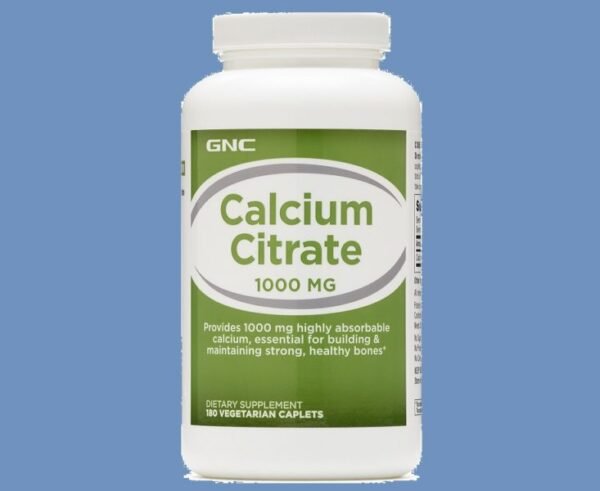Calcium citrate is a compound containing calcium and citrate. It is commonly used as a dietary supplement especially in patients with osteoporosis, osteomalacia, and rickets. It may also be used (off-label) in patients for the management of chronic hypocalcemia secondary to hypoparathyroidism.
Calcium citrate Dose in Adults
Note: 1000 mg of Calcium citrate contains 211 mg of elemental calcium that is equivalent to 10.5 mEq calcium.
Off label use in the management of chronic hypocalcemia secondary to Hypoparathyroidism:
- 500 mg - 1 gms of elemental calcium orally administered twice or thrice daily.
- Some patients may require more frequent and higher doses.
- Patients with severe hypocalcemia (corrected calcium of less than 7 mg/dl) and in symptomatic patients who have tetany, seizures, arrhythmias, laryngeal or bronchospasm should be advised calcium as an intravenous formulation.
Use as dietary calcium supplementation (OTC labeling):
- 200 mg - 1 g/day (as elemental calcium) orally as a single dose or in divided doses.
It should be noted that calcium does not improve bone strength. The recommended required amount of calcium should be acquired from dietary sources.
Calcium requirements in postmenopausal women is 1.2 gms per day and 1 gm in other adults.
Calcium citrate Dose in Childrens
Note: 1000 mg of Calcium citrate contains 211 mg of elemental calcium that is equivalent to 10.5 mEq calcium.
Use as a supplement:
- Children 1 - 6 months of age:
- 200 mg/day of elemental calcium orally
- 7 - 12 months:
- 260 mg/day of elemental calcium orally.
- 260 mg/day of elemental calcium orally.
Recommended daily allowance (RDA)
- 1 - 3 years:
- 700 mg/day of elemental calcium orally.
- 4 - 8 years:
- 1,000 mg/day of elemental calcium orally.
- 9 - 18 years:
- 1,300 mg/day of elemental calcium orally.
Use as Hypocalcemia:
- Infants and Children:
- 45 - 65 mg/kg/day of elemental calcium orally in 4 divided doses.
- The dose should be adjusted according to the patient's cacium levels.
Pregnancy Risk Factor B
Calcium citrate during pregnancy:
- Calcium crosses the placental boundary
- Pregnancy increases calcium absorption from the digestive tract.
- Calcium requirements for pregnant and unpregnant women are identical.
Calcium Citrate use during breastfeeding:
- Breastmilk contains calcium and it can be used during lactation.
Calcium citrate Dose in Renal Disease:
- Dose adjustment is based on the patients' serum calcium levels.
- Patients with kidney disease require the concomitant administration of activated vitamin D (alfaclcidol or calcitriol)
Calcium citrate Dose in Liver Disease:
No dose adjustement is required in patients with liver disease.
Common Side Effects Of Calcium Citrate Include:
- Mild hypercalcemia (calcium levels of more than 10.5 mg/dL)
- Constipation
- Anorexia
- Vomiting.
- Nausea
- More severe hypercalcemia (calcium levels of more than 12 mg/dL)
- Confusion
- Delirium
- Coma
- Stupor.
- Central nervous system:
- Headache
- Endocrine & metabolic:
- Hypophosphatemia
- Hypercalcemia
- Increased thirst
- Gastrointestinal:
- Anorexia
- Abdominal pain
- Constipation
- Vomiting
- Nausea
Contraindication to Calcium Citrate include:
- Conditions that cause hypercalcemia should be avoided.
- These conditions include primary hyperparathyroidism and multiple myeloma.
- Metastatic bone disease, familial hypocalcemia, and vitamin toxicity.
Warnings and Precautions
- Hypercalcemia:
- Kidney stones containing calcium:
- Patients who have a history of nephrocalcinosis or nephrolithiasis should be cautious about taking the drug.
- Renal impairment
- Hypercalcemia should be checked in patients with chronic renal failure who are receiving calcium replacement.
Calcium citrate: Drug Interaction
|
Aluminum Hydroxide |
Chronic hypercalcemia has been linked to generalised vascular and soft tissue calcification, nephrolithiasis,and increased mortality in persons with chronic kidney disease (CKD). Aluminum Hydroxide absorption may be increased by derivatives of citric acid. |
|
Calcium Channel Blockers |
The therapeutic benefit of calcium channel blockers may be reduced by calcium salts. |
|
Cardiac Glycosides |
Cardiac Glycosides' ability to induce arrhythmias may be increased by calcium salts. |
|
DOBUTamine |
.Calcium Salts may reduce DOBUTamine's therapeutic efficacy. |
|
Multivitamins/Minerals (with ADEK, Folate, Iron) |
May increase the serum concentration of Calcium Salts. |
|
Thiazide and Thiazide-Like Diuretics |
Calcium Salts' excretion might be reduced. Metabolic alkalosis can also be brought on by continued concurrent usage. |
|
Vitamin D Analogs |
The harmful or poisonous effect of vitamin D analogues may be increased by calcium salts. |
|
Risk Factor D (Consider therapy modification) |
|
|
Alpha-Lipoic Acid |
Alpha-Lipoic Acid may not be absorbed as well when exposed to calcium salts. The absorption of calcium salts may be decreased by alpha-lipoic acid. |
|
Bictegravir |
Calcium salts may lower the level of bictegravir in the blood. Treatment: Under fed settings, bictegravir, emtricitabine, and tenofovir alafenamide can be provided with calcium salts; however, under fasting conditions, coadministration with or two hours after a calcium salt is not advised. |
|
Bisphosphonate Derivatives |
Products containing polyvalent cations may lower the level of bisphosphonate derivatives in the serum. The following oral drugs should not be used within the following time frames: 2 hours before or after tiludronate/clodronate/etidronate; 60 minutes after oral ibandronate; or 30 minutes after alendronate/risedronate. Pamidronate and zoledronic acid are exceptions. |
|
Deferiprone |
Products containing polyvalent cations may lower the level of deferiprone in the serum. Treatment: Give deferiprone at least four hours apart from oral drugs or dietary supplements containing polyvalent cations. |
|
Dolutegravir |
Dolutegravir's serum levels may be lowered by calcium salts. Treatment: Dolutegravir should be administered at least two hours before or six hours after oral calcium. Dolutegravir/rilpivirine should be administered at least 4 hours before or 6 hours after taking oral calcium salts. Oral calcium and dolutegravir can also be consumed with meals. |
|
Eltrombopag |
Products containing polyvalent cations may lower the serum concentration of eltrombopag. Treatment: Give eltrombopag at least two hours before or four hours after taking any oral medication containing polyvalent cations. |
|
Estramustine |
Calcium salts might make it harder for estramustine to be absorbed. |
|
Multivitamins/Fluoride (with ADE) |
Calcium salts' serum concentration might rise. Fluoride and multivitamin serum concentrations may be lowered by calcium salts (with ADE). More specifically, calcium salts might make it harder for people to absorb fluoride. Treatment: Refrain from taking dairy products, vitamins, or dietary supplements containing calcium salts an hour before or an hour after receiving fluoride. |
|
PenicillAMINE |
Products containing polyvalent cations may lower the level of penicillAMINE in the serum. Treatment: Give oral medications containing polyvalent cations and penicillamine at least an hour apart. |
|
Phosphate Supplements |
Phosphate supplements' absorption may be reduced by calcium salts. Management: This only pertains to the oral administration of calcium and phosphate. The importance of the interaction may be reduced by giving oral phosphate supplements as widely apart as possible from giving an oral calcium salt. Sodium Glycerophosphate Pentahydrate is an exception. |
|
Quinolones |
Quinolones may be less readily absorbed if you take calcium salts. only when both drugs are administered orally. LevoFLOXacin (oral inhalation) and moxifloxacin are exceptions (Systemic). |
|
Strontium Ranelate |
Strontium Ranelate serum levels may be reduced by calcium salts. To reduce this interaction, strontium ranelate and oral calcium salts should be administered at least two hours apart. |
|
Tetracyclines |
Tetracyclines' serum levels may be reduced by calcium salts. Management: If oral calcium and oral tetracyclines must be administered simultaneously, think about giving each medication several hours apart. Eravacycline is an exception. |
|
Thyroid Products |
The therapeutic value of thyroid products may be reduced by calcium salts. Treatment: Give the thyroid medication and the oral calcium supplement at least 4 hours apart. |
|
Trientine |
Products containing polyvalent cations may lower the level of trientine in the serum. Management: Steer clear of combining the use of oral medications containing polyvalent cations with trientine. If you need to take oral iron supplements, space out the administration by two hours. Separate administration of other oral polyvalent cations by one hour if necessary. |
|
Risk Factor X (Avoid combination) |
|
|
BaloxavirMarboxil |
Products containing polyvalent cations may lower the level of baloxavir-marboxil in the serum. |
|
Calcium Acetate |
Calcium Salts may intensify Calcium Acetate's harmful or poisonous effects. |
Monitor:
- Serum total calcium levels or ionized calcium (preferred)
- Serum Phosphate levels
- Serum Magnesium
- Parathyroid hormone levels, 25 OH vitamin D, and Bone density (in specific patients)
- Renal imaging & CNS imaging for nephrocalcinosis, nephrolithiasis, and basal ganglia calcifications (in specific patients).
How to administer Calcium Citrate?
Calcium citrate may be taken with or without food, however food increases its absorption.
Mechanism of action of Calcium Citrate:
- By increasing blood calcium levels, calcium outflow from the bones is reduced and parathyroid hormone is suppressed by calcium citrate.
- It is necessary for optimal nerve and muscle performance via regulation of the activity potential.
25%-35% of the drug can be resoldabsorbedFrom the gastrointestinal tract and isVitamin D is essential. Patients with achlorhydria, kidney disease and a diarrheal condition have impaired absorption 45 percent of the drug is Protein-bound, and is excreted primarily through the feces.
International brands of Calcium Citrate:
- Cal-Citrate
- Calcitrate
- Calbo
- Calcibon
- Calcite
- Calcival D
- Calteo
- Citrokalcium
- Jia-Cal
- Mei-Cal
Calcium citrate Brands in Pakistan:
No brands available in Pakistan




